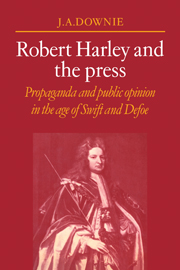Book contents
- Frontmatter
- Contents
- Preface and Acknowledgements
- Author's note
- Introduction
- Part one 1689–1708
- Part two 1708–1714
- 5 The tory resurrection, 1708–1710
- 6 Swift, Defoe, and the peace campaign
- 7 The stamp act of 1712
- 8 The organisation of propaganda, 1710–1714
- Epilogue: impeachment and after
- Abbreviations
- Notes
- Index
6 - Swift, Defoe, and the peace campaign
Published online by Cambridge University Press: 07 October 2011
- Frontmatter
- Contents
- Preface and Acknowledgements
- Author's note
- Introduction
- Part one 1689–1708
- Part two 1708–1714
- 5 The tory resurrection, 1708–1710
- 6 Swift, Defoe, and the peace campaign
- 7 The stamp act of 1712
- 8 The organisation of propaganda, 1710–1714
- Epilogue: impeachment and after
- Abbreviations
- Notes
- Index
Summary
John Oldmixon remarked that Daniel Defoe and Jonathan Swift were ‘fellow labourers in the service of the White Staff’. Under the Oxford ministry Swift gradually assumed control of the tory propaganda machine. Not only the Examiner fell within his sphere of influence, even after he had finished contributing to the paper on a regular basis himself, but the other principal tory press organ, Abel Roper's Post Boy, was evidently in Swift's pocket. ‘Roper is my humble slave’, he once confessed, and there can be little doubt that the Post Boy was, in Irvin Ehrenpreis's words, ‘the ministerial paper’. But Oldmixon took a jaundiced view of the relative importance of the ‘fellow labourers’ to the Oxford ministry. He felt that Oxford paid Defoe better than he did Swift merely because he thought him ‘the shrewder head of the two for business’. Defoe, like Swift, indulged in self-delusion. He preferred to think he had retained his integrity as a writer. But it was precisely this feature of his psyche which rendered him so very useful to Oxford. He made no pretence to political power, and his conscience could be readily eased by the application of specie.
Oldmixon, then, paid no heed to Swift's careful scrupulousness to retain his independence. He regarded Swift's pomposity with cool whig cynicism. Although he refused to take money for his services to the ministry, Swift expected to be rewarded with an English bishopric, or at least an English deanery.
- Type
- Chapter
- Information
- Robert Harley and the PressPropaganda and Public Opinion in the Age of Swift and Defoe, pp. 131 - 148Publisher: Cambridge University PressPrint publication year: 1979



